
Finding a Job in Japan: Best Resources and Tips
Interest in Japan, either for traveling or for living and working, has been growing exponentially over the years. More people than ever now want to go there and be a part of that culture. But managing a job in a new country comes with its unique set of challenges.
Nothing is tough when you try hard and follow the correct procedures. All you need is a road map pointing out the rules and resources to find a job in Japan. Yes, you will be dealing with companies where the working culture is quite different from what you are used to. I’m here to explain everything regarding the working culture, general job requirements, resources, and useful tips.
Quick Navigation

A Look into the Japanese Work Culture
The Japanese companies are now more open to hiring foreign workers after the easing of the strict immigration policies and foreign labor controls in April 2019. Work opportunities have been created in various sectors and many white-collar companies are willing to have some ‘English’ faces.
While these changes are encouraging to the foreign workforce, you must be familiar with the Japanese work culture to know what to expect. In most sectors, foreigners make less than 2% of the workforce, so you are unlikely to have anyone else other than Japanese colleagues in your workplace.

The norms and practices that define a Japanese workplace are:
- The offices are highly formal where everyone maintains courtesy and politeness. Calling someone by their first name would be considered rude. The dress codes are formal too with no place for bright colors.
- Japanese workplaces are driven by a group mentality where teamwork gets the highest value. The company’s interest is given priority and all decisions are taken with the whole business in mind.
- Ho-ren-so is the mantra for many Japanese companies. It’s a mnemonic that consists of the first syllables of three words: houkoku or “report”, renraku or “contact”, and soudan or “consult”. It means employees have to keep their superiors in the loop about their work. They cannot make any decision or take any action without following a chain of command.
- Due to following the chain of command and the necessity of informing everything to the superiors, Japanese workplaces have a slow-moving approach despite being well-planned.
- Japanese coworkers like to hang out together after work. It’s not a necessity but a good way for networking. For newcomers, it’s a great opportunity to get to know their colleagues.
General Job Requirements for Foreign Candidates
Anyone cannot just fly to Japan and start working. While you have to fulfill the specific requirements of a company, all foreign applicants should have these qualities to get a well-paid white-collar job:
A University Degree
A four-year university degree (which is a three-year degree in some countries) is one of the requirements for a regular Japanese work visa. A college degree won’t be enough for the Japanese Immigration.
However, you can still live and work in Japan without a degree. Get the details here.
Japanese Language Proficiency
Without language proficiency, many recruiters won’t consider you for a professional job. You will need at least a Level 2 proficiency in the Japanese Language Proficiency Test (JLPT). It’s like the IELTS or TOEFL for the Japanese language.
There are five proficiency levels in the JLPT and Level 1 is the highest. So, getting a Level 2 means you have to have almost native-like mastery.
Two sectors where language competence does not matter much are the IT and English Language Teaching. However, you still need to overcome the language barrier for daily activities and getting around.
Requirements for Blue-Collar Jobs
People who don’t have a university degree can apply for manual labor jobs in the agricultural, factory, and construction sectors. However, the current system does not allow foreign people to get a sponsored work visa for these jobs.
One way to bypass this system is to study at a Japanese university and work part-time. Also, those who are already in Japan with a valid work visa can do these unskilled jobs.
Other eligible candidates are those accepted as Technical Intern Trainees or Specified Skilled Workers under the Japan International Trainee & Skilled Worker Cooperation Organization (JITCO).
Best Websites for Finding a Job in Japan
There are a great number of job sites in Japan where foreigners and locals can look for work matching their skills. To make your job hunting a bit easier, I have categorized some best job sites into three sections:
Job Portals
Job portals could be a good place to start your job hunting in Japan. These websites give an idea about the jobs in demand and the companies that have openings. Some websites are rich in content about living and working in Japan.
1. GaijinPot
Undoubtedly, the most popular and resourceful website for non-Japanese people to find a job and live in Japan. Apart from searching for jobs, you can use this website for studying, traveling, finding an apartment, and other related things.
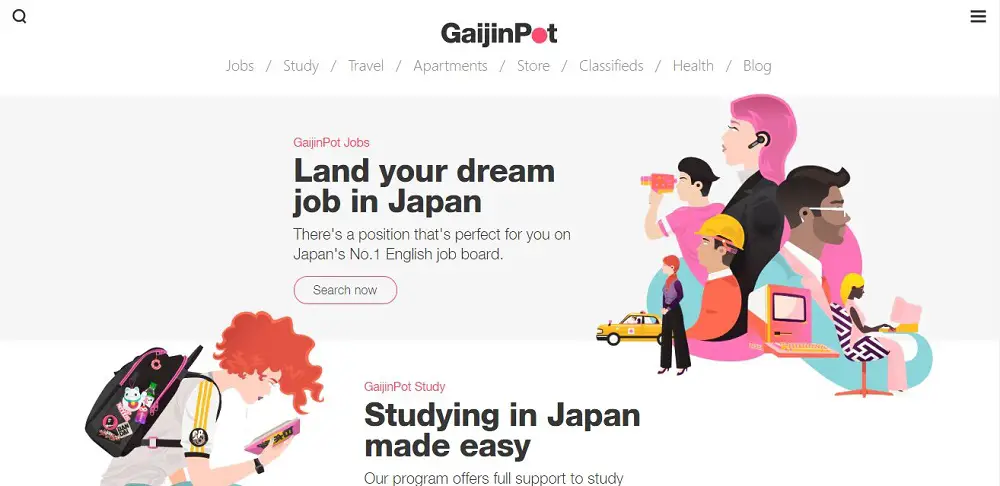
How does it help to find a job? The neatly-organized job section has sorted the listings in various useful categories including, Full-time, Part-time, Direct Hire, Remote Work, No Nihongo or “Japanese language”, and more. There’s a search bar where you can put keywords and filter by industries and locations.
Standout features. There’s a classifieds page where you can put ads for buying or selling anything. You can also look for roommates, buy tickets, and find events of your interest.
Visit the official website here.
2. Daijob
For over 20 years, the portal has been working as a bridge to connect job seekers with employers. It’s one of the largest resources for multilingual job hunters. The home page shows the number of active jobs and a quick search option. You can also see the job categories, newly added companies, and two separate sections for Career Advice and Career Fair.
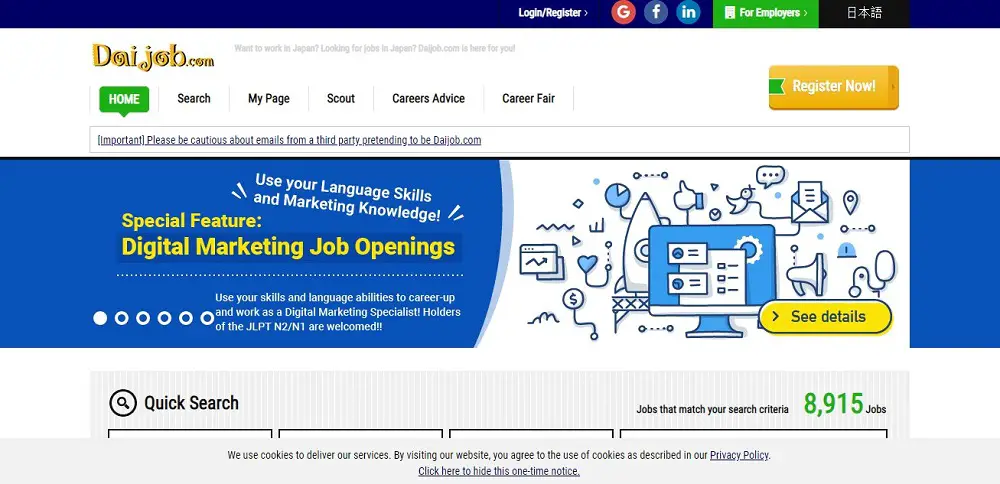
How does it help to find a job? The dedicated job search section has various filters so you can narrow down the search results and find exactly what you are looking for. You can select your desired industry, salary range, work locations, company types along with a few other factors.
Standout features. Daijob offers a ‘Scout’ service. Registering to this service creates a better chance of matching with a company that is looking for someone with your language skills and experience.
Visit the official website here.
3. Yolo Japan
A relatively new job site, but it’s geared towards foreigners in Japan looking for short- and long-term jobs, with emphasis on the former type. The job seekers in this site are mostly bilingual or multilingual people willing to take new challenges in exciting professional environments.
The website offers a SIM card service, hotel information, and free seminars on the Japanese language for beginner learners.
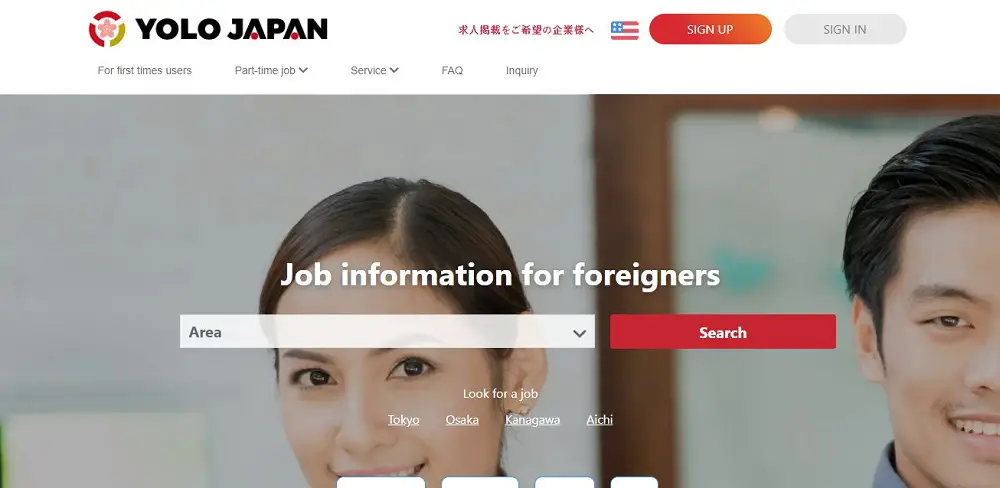
How does it help to find a job? You can search for area-based jobs from the home page. There are options to choose from job categories and a separate section is there for checking the new job listings.
There is a dedicated page for part-time jobs. You have to put keywords on the search bar and filter by selecting an area and your Japanese level.
Standout features. Being dedicated mostly to part-time job seekers, this website has some unusual job listings tailored to people with no specific expertise. For example, some jobs will pay you for completing surveys, wearing a kimono, or testing an app.
Visit the official website here.
4. CareerCross
Founded in 2000, this portal is dedicated to bilingual foreign and Japanese professionals. With thousands of listings, it helps people to connect with small to mid-size companies. There is a Career Advice section equipped with resources for getting a job in Japan.
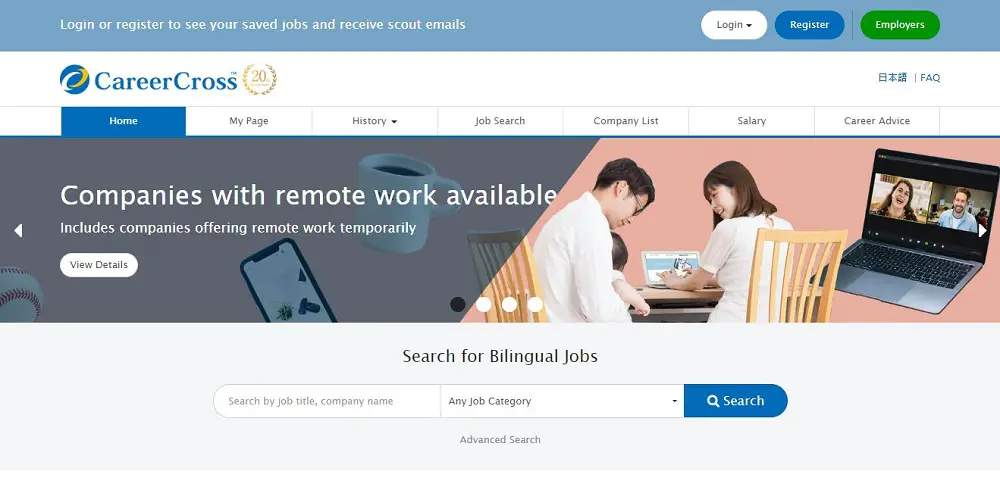
How does it help to find a job? The job searching engine is quite thorough and offers many filter options. You can customize the search according to job type, location, salary range, language skills, and more.
One ingenious filter is “Jobs by Train Line”, allowing applicants to search for jobs by train lines to reduce the commuting hassle in big cities.
Standout features. The website has a separate page, giving an insight into the salary ranges in various Japanese industries. There are search boxes to look for salary ranges according to various Japanese prefectures, which can be further customized based on the candidate’s experience, education, language proficiency, and a few other factors.
Also, there is a page for company lists ordered alphabetically. Beside each company name, you can see the number of job openings and links to those listings.
Visit the official website here.
5. Jobs in Japan
Founded by an American living in Japan, the website has a decent number of job postings along with resources that will come handy for the candidates. You can look for full-time and part-time jobs and sort them out by a work visa sponsorship.
The blog has tips, suggestions, and advice for foreigners regarding job seeking and living in Japan.
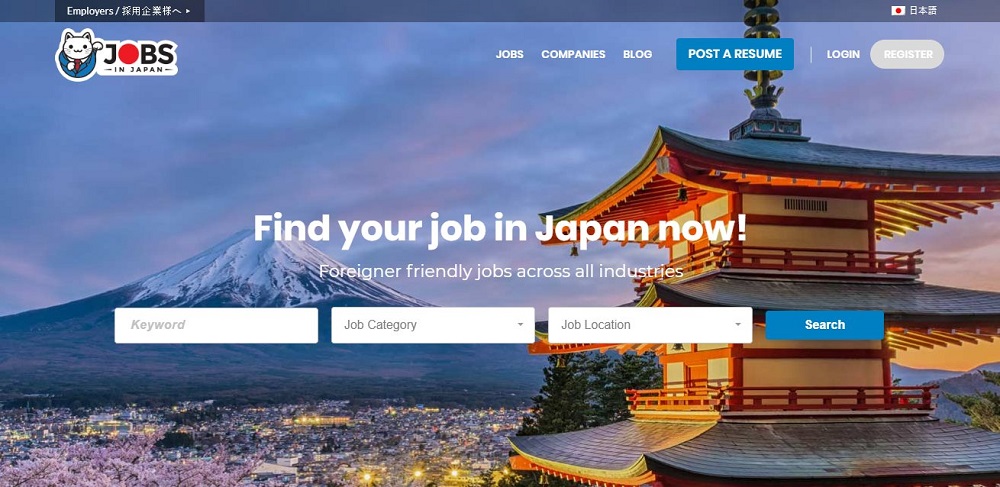
How does it help to find a job? The job section offers options for customized job searching based on different variables. This page also displays many featured jobs from prestigious companies.
Standout features. It offers an alphabetically organized company listing completed with the number of job openings they have. Clicking on the company logo will take you to a separate page featuring a brief intro to the company and details about the jobs it is offering.
Visit the official website here.
Websites for Specialized Jobs
Check the following programs and websites if you are looking for jobs in a specific sector.
1. The JET Programme
It’s highly common for native English speakers to take an English-language teaching job in Japan. The Japan Exchange and Teaching (JET) Programme is the most credible source for securing a teaching job.
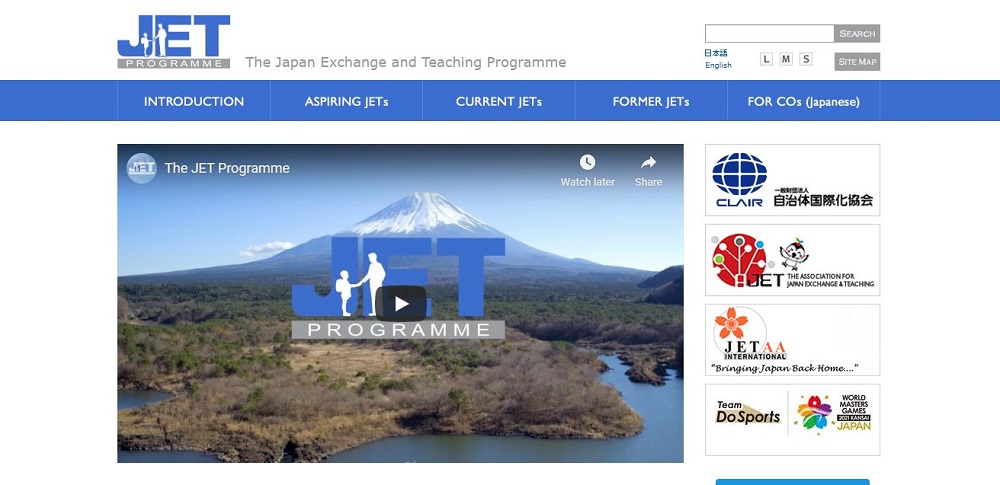
Run by the government, this program calls for applications from university degree holders. If selected, you will get a one-year contract that can be extended to five years.
Teaching positions at international schools, private language schools, technical schools, colleges, and universities are also available. Check TEFL and SeekTeachers for the job listings.
2. Mixess
Looking for tech and IT jobs in Japan? You should definitely visit Mixess, a job portal that lists many jobs in the IT and engineering industry. Aspiring applicants can also get tips for acing an interview, resume suggestions, and online consultation.

The Job Search section offers options for tailoring the searches according to job types, languages, and locations.
Visit the official website here.
3. Working Holiday
Working Holiday is a bilateral exchange program run by the Ministry of Foreign Affairs of Japan. Young people from the partner countries can enter Japan and spend holidays by doing part-time work.
After acquiring the visa from the Embassies or Consulates-General of Japan in your country, you can fly to Japan and stay there for a maximum of one year (depending on the visa).
Check the list of the countries that participate in this partnership here.
Recruiting and Headhunting Companies
Other than the job portals, the recruiting companies also play a crucial role in securing a job in Japan. Given that you have a high level of language competence and specialized skills, these companies can offer you better jobs with a higher salary.
1. HAYS
This British recruiting agency has been running its operation in Japan since 2001. It provides resources for both employees and employers. You can search for highly skilled jobs in various sectors.
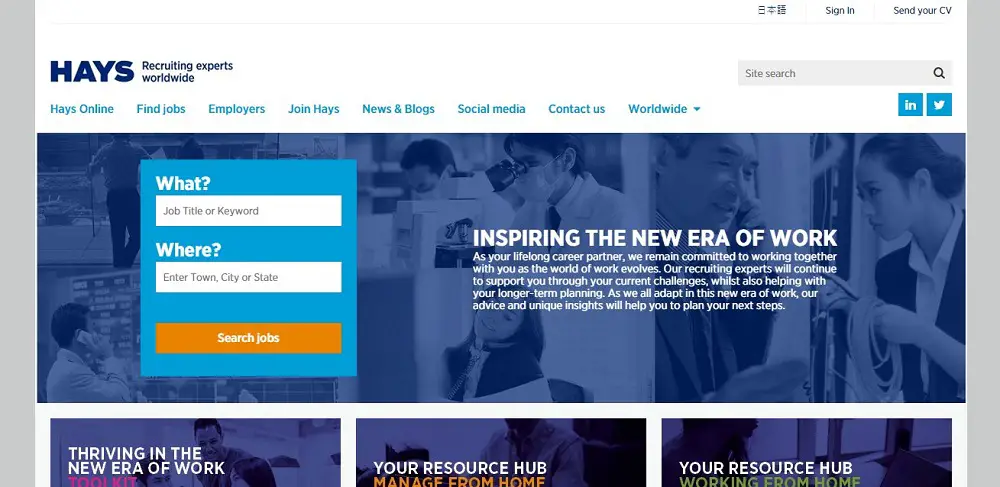
The best way to utilize this platform is to create an account and send your CV so that they can connect you to relevant companies.
Visit the official website here.
2. En world
Belonged to en Japan Inc., en world is a big player in the Recruitment and Staffing sector in Japan. Dedicated to multilingual candidates, the listings here are focused on high-salary jobs. It offers a handful of suggestions and services for both applicants and employers.

The job section has hundreds of listings that you can sort out by category and location. There is also an option for selecting permanent, temporary, and contract-based jobs.
Visit the official website here.
3. Robert Walters
Another British company that has been operating in Japan since 2000. Like all other recruiting companies, it offers career advice, job listings, and an option for submitting your CV.

Robert Walters offers services from specialist staff members, which means a digital marketing specialist won’t deal with automotive jobs. Also, many recruiters are international companies offering a bilingual work environment in Japan, which makes it easier for foreigners to adapt and learn.
Visit the official website here.
Tips for Applying to Jobs in Japan
Even after having the language proficiency and required skills, you may face rejections for simply not following the standard practices. This happens due to coming from a different country (where the rules are different) and not being informed about the job etiquette and formalities.
Put a Photo in the Resume and Cover Letter
A resume or cover letter photo is not the norm in the United States and many European countries, but it’s the standard practice in Japan. A photo helps the HR manager to put a personality and face to the skills described in the resume.

Attach a professional-looking headshot. Otherwise, it will be thrown into the wastepaper basket.
Creative File Names are Important
A listing on a job board receives responses from numerous applicants. When a recruiter peruses the listing, they skim through a long list of files named “resume.pdf”. To make yours stand out and increase the chance of getting hired, be creative.
For example, your resume filename could be “digital-marketer-social-media-expert-resume.pdf” for a digital marketing job or “experienced-customer-support-resume.pdf” for a customer service job.
Be Already in Japan
Getting a job is easier when you are already in Japan on a long-term visa. Yes, some companies are open to video interviews and offering sponsorship if everything goes well. But many businesses are unwilling to take the risk of a failed overseas hire.
It will be a waste of time and money if they find you unfit during the training period because they have already paid for your flight to Japan, setting up, and probably accommodation too.
One way to be in Japan on a long-term visa is to take an English teaching job. Getting this job is relatively easier and when you are set up, start looking for other opportunities.
Networking is the Key
Landing to your desired jobs becomes easier if you can get yourself out there and make connections. If you are already in Japan, network as much as possible by joining some professional groups and socializing with your co-workers after work.

For virtual networking, LinkedIn is an incredibly useful platform. Share your latest projects and career goals on the feed so others in your network can see. Also, you can politely approach recruiters and hiring managers if they post about any opening.
Get an Internship
If you are a fresh university graduate and don’t like teaching, an internship could be a good option. Although the trainee has to pay for it, consider this paid internship as an investment because it will give you exclusive insights into Japanese work environments.
An eight-week internship means ongoing mentorship where a person will teach you invaluable lessons vital for landing into a full-time job.
The Common Interview Questions
Japanese interviewers don’t ask the usual “why should we hire you?” or “what do you expect to gain from this position?” questions. Their approach is more direct, and the most asked questions are:
- “Are you capable of doing the job?”
- “Will you like the job?”
- “Do you think if we’ll like you?”
Confident and in-detailed answers to these questions will convince the interviewers about your potential. Keep the characteristics and expectations of the Japanese work culture in mind during the interview. Shape your answers around what you can do for the company, not what you expect from them.

Your Interview’s First 30 Seconds are Crucial
Why? Because the interviewer looks for mistakes actively during this period. It makes sense because they need to cut down the screening time to interview as many candidates as possible. Be extra careful during this time.
DON’T Do These Mistakes…Ever
Despite following all the rules and applying the tips, you may still miss the job for doing some silly mistakes. Never do these following things:
Don’t apply to every job you come across. Doing this means you spend less time researching the company and crafting your cover letter and resume according to the job requirements. Hustling makes you prone to mistakes and your applications generic.
Never prioritize your expectations but the company’s. Japanese workplaces focus on group mentality, not on individuals. In the cover letter, highlight how your skills are going to benefit the company, not your personal goals.
Don’t neglect a video interview. Treat it as seriously as a real one. Never dress up or act casual during a Skype interview. Just like a face-to-face interview, act professional, beware of your postures, and make good eye contact.
Conclusion
Many people want to move to Japan to experience its rich culture and numerous interesting subcultures as an insider along with traveling all the nooks and crannies of this beautiful country. As the living expenses are high, you must need an income source and that’s where this guide comes handy. It could be your go-to manual for landing your dream job in Japan.




